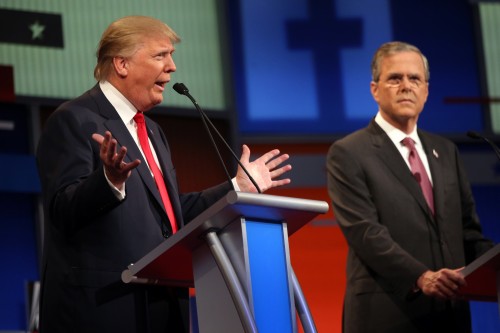
Donald Trump’s race for the presidency has proven to be less of a political campaign and more of a media spectacle. The businessman and television personality has teased the idea of running for high office for years, but when he announced June 16 he was campaigning for the Republican nomination it became evident that the joke was now a reality.
This is not to say that a person with zero political experience is automatically deemed unfit for the presidency. In fact, Trump is not the only Republican candidate lacking political experience: Neurosurgeon Ben Carson, too, lacks any real political experience. Unfortunately, it’s been Trump’s outlandish statements and a media more than happy to cover these bizarre comments, not policy positions, that fueled his ascendance to the top of Republican polls.
According to a study conducted by the Media Research Center (MRC), Trump has received an overwhelming amount of media coverage compared to his fellow Republican candidates. The study found that from Jan. 1-July 31, the ABC, CBS and NBC evening newscasts gave Trump 10 times the amount of airtime than the average of his competitors. These newscasts also allotted significant airtime to Trump’s controversial comments, MRC Research Director Rich Noyes wrote in his report of the study.
“More than half of the evening news airtime focused on Trump’s inflammatory comment about illegal immigrants from Mexico (40 minutes of airtime, or about 32 percent of Trump’s coverage and his apparent belittling of Senator John McCain’s war record (28 minutes, or 24 percent of the coverage,” Noyes wrote. “Other negative controversies (general complaints about his rhetoric, his spats with other candidates) accounted for another 14 percent of Trump’s total airtime (16 minutes).”
Media coverage of Trump’s campaign is quite possibly the best evidence that the old saying, “There’s no such thing as bad publicity,” is true. Everything the man says is click bait. Which is the American public more likely to read: a story covering Sen. Ted Cruz’s immigration policy or an article covering a racist comment made by one of America’s wealthiest and well-known men, who just happens to be running for president?
It seems Trump has gotten this far in the campaign because he says whatever he likes, regardless of the backlash he may receive, and that is a big contributor to why even after the Republican debate he still has the most supporters out of all the candidates. Compared to the seasoned politicians, Trump’s lack of filter appears attractive—even when his unfiltered comments are racist, sexist or just outrageous.
The real estate mogul is by no means oblivious to the public’s frustration with our representatives.
“I think the big problem this country has is being politically correct,” Trump said during a recent stop in Cleveland.
And maybe he is right. Many view American politicians as standing not for what they believe in, but for whatever gets them reelected for another term. Consider the results of a February 2014 Pew Research Center poll: only 24 percent of Americans reported they trust the government in Washington always or most of the time.
Still, Trump’s off-the-cuff comments do not necessarily mean he is the man that can improve the American public’s trust in our government. After all, he has repeatedly refused to provide any specifics on several policy issues.
When asked what he would do to improve job growth, he said, “You’ll see details. But basically I’m telling you I’ll just bring them back. It’s called negotiation.”
It appears his only firm policy is building a massive wall on the Mexican border and somehow forcing Mexico to pay for it. Details on how he would do this are still unknown.
Even still, some think Fox News gave Trump an unfair amount of attention in the Republican debate, asking him questions about past bankruptcy and giving him an extra 30 seconds to provide his “evidence” of the Mexican government sending over criminals. Trump claimed his conversation with “border patrol people” prove these accusations.
21-year-old Matthew Runyan of Belvidere, Ill. considers himself a libertarian, but argues that Trump’s significant airtime during the debate was necessary.
“Although I do not think it was fair to give Trump over 10 minutes of talk time, he needed it,” Runyan said.” “Trump is not a professional political, and he is far from acting professional and being politically correct. Trump needed to clear the air on things that he had said and done in the past.”
Trump’s competitors for the Republican nomination would likely disagree with that argument. Jeb Bush took it upon himself to highlight Trump’s troublesome statements.
“Mr. Trump’s language is divisive,” Bush said during the debate. “I want to win.”
Trump replied to Bush in his typical style, again arguing that political correctness should not be such a priority in Washington.
“We don’t have time for tone,” Trump said. “We have to go out and get the job done.”
This unapologetic attitude may have allowed Trump to be in the position he is today. But it appears his hogging of airtime and aggressive manner at the debate damaged his appeal in Iowa. According to a poll of Iowa Republican primary voters, 55 percent of debate viewers said they are now less comfortable with Trump being a candidate for president.
If Trump’s widespread appeal is that he is not a politician, and therefore not as corrupt as the other Republican candidates, perhaps the media should pay more attention to the other candidate without political experience: Carson. Public Policy Polling found that following the debate, 12 percent of Iowa Republican primary voters supported Carson. This puts him in second place among Iowans, behind frontrunner Trump. It is not a stretch to say that Carson’s extreme lack of airtime — Carson just 74 seconds during MRC’s study of evening news broadcasts compared to Trump’s 116 minutes — is a main contributor to his recent surge in the polls.
Media coverage is essential to every candidates campaign. Without it, presidential hopefuls’ struggle for name recognition among voters. Trump started his campaign with nearly 100 percent name recognition, and his flamboyant behavior ever since has consistently kept him in the headlines.
Whether Trump will be able to maintain his lead with his current behavior remains unclear. But even in the case that he fails to get the Republican nomination, Trump will likely still reap the benefits of the massive media coverage that has surrounded him since announcing he would be running for president.
After all, this is the same man who once said, “You know, it really doesn’t matter what the media write as long as you’ve got a young and beautiful piece of ass.”
Elegantly put, Mr. Trump.







